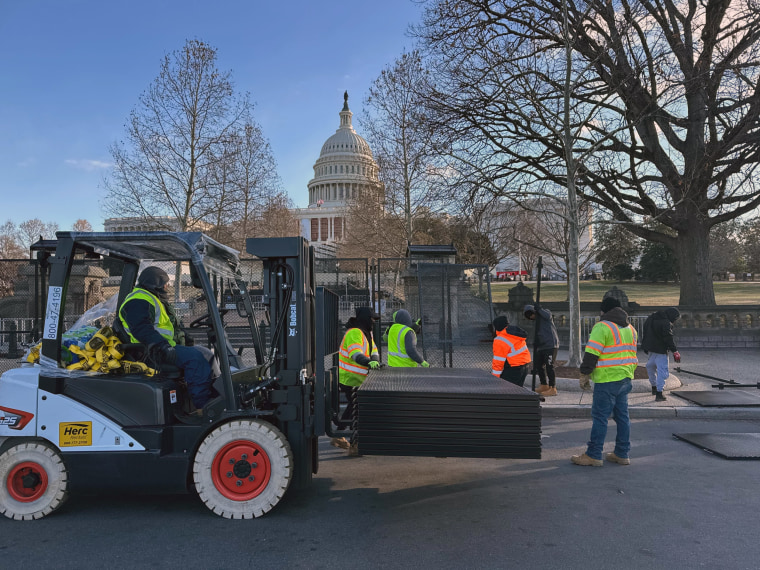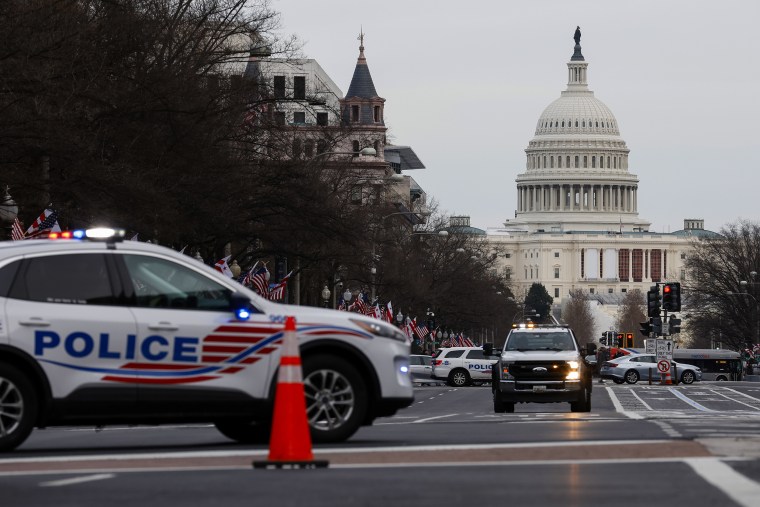WASHINGTON — Four years after supporters of Donald Trump stormed the U.S. Capitol in support of his efforts to overturn his 2020 election loss, members of Congress were under heavy security Monday as they certified Trump's 2024 election victory, ensuring the first president to face federal felony criminal charges will return to the White House in two weeks.
On Jan. 20, Trump will walk through the Lower West Tunnel — the location of some of the worst violence of the attack on Jan. 6, 2021 — to take the oath of office as the 47th president of the United States. Trump, who himself faced four felony charges in connection with Jan. 6 and his efforts to overturn his 2020 election loss, has vowed to pardon some untold number of Jan. 6 defendants when he takes office.
But details of Trump's plans are uncertain even as the final days of President Joe Biden's term tick away.
More than 1,580 defendants have been charged and about 1,270 have been convicted in a sprawling investigation that has resulted in more than 660 prison sentences, according to statistics released Monday by the U.S. Attorney’s Office for the District of Columbia.
Prison sentences have ranged from a few days behind bars to 22 years in federal prison, a sentence imposed on former Proud Boys chairman Enrique Tarrio after he was convicted of seditious conspiracy. Hundreds more Jan. 6 defendants have been sentenced to probation, most of whom were convicted of low-level offenses like unlawful parading.

In September, the federal government declared the Electoral College certification a National Special Security Event, heightening the level of security at the Capitol. Though there were no major protests Monday, the government put severe security measures in place that will remain as law enforcement agencies deal with other upcoming events, including funeral events for former President Jimmy Carter and Trump’s inauguration on Jan. 20.
On Saturday morning, about 36 hours before a snowstorm hit Washington, workers at the Capitol were placing additional layers of high fencing around the Capitol grounds, including on the west front, which Trump supporters took over during the Capitol attack four years ago.
Trump, like many of his fellow Republicans, underwent a massive shift in his rhetoric since the Jan. 6 attack, from calling the Capitol breach a "heinous attack" in 2021 to describing it as a "day of love" last year. The effort to rewrite the history of Jan. 6 has been aided by numerous conspiracy theories that Trump allies on Capitol Hill have propagated.
The president-elect said on "Meet the Press" last month that Jan. 6 defendants were subject to “a very nasty system” and that he would be “acting very quickly” on Jan. 6 pardons.
Trump has said there “may be some exceptions” to his Jan. 6 pardons “if somebody was radical, crazy,” but he did not rule out pardoning people who had admitted assaulting police officers. The Trump transition team has said pardons will be issued “case by case,” but Trump has said the “vast majority” of Jan. 6 defendants should not be in jail.

The U.S. attorney's office said that just eight pretrial defendants remain in jail in Washington, while all the other incarcerated Jan. 6 defendants are serving the sentences imposed after their convictions.
While more misdemeanor cases against low-level Jan. 6 defendants seem unlikely in a Trump administration, it is not yet clear how pending cases against people accused of assaulting law enforcement officers will be handled.
Online “sedition hunters” who have already aided the FBI in hundreds of Jan. 6 cases say more than 200 people suspected of committing assaults on law enforcement officers or members of the media have been identified but have not yet been arrested. Among them are more than 60 people whose images are featured on the FBI website that lists them as wanted for assault.
Biden implored lawmakers Sunday to speak truthfully about the Capitol attack, in which more than 140 police officers were injured and after which some law enforcement officers died, at an event with newly elected Democratic lawmakers.
“Now, it’s your duty to tell the truth, to remember what happened and not let Jan. 6th be rewritten,” Biden said. “It’s one of the toughest days in American history.”
